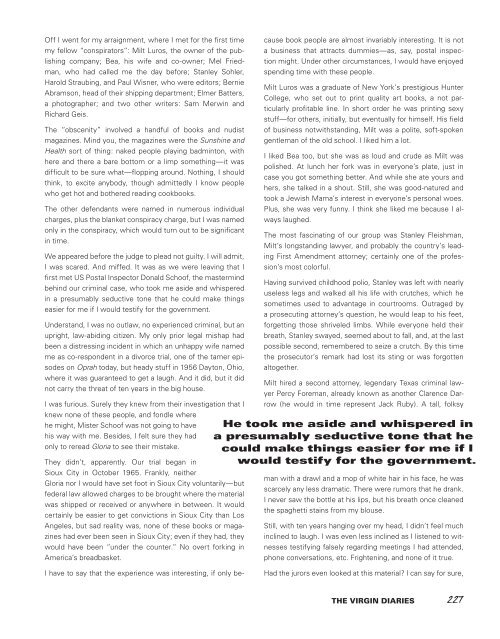Create successful ePaper yourself
Turn your PDF publications into a flip-book with our unique Google optimized e-Paper software.
Off I went for my arraignment, where I met for the first time<br />
my fellow “conspirators”: Milt Luros, the owner of the publishing<br />
company; Bea, his wife and co-owner; Mel Friedman,<br />
who had called me the day before; Stanley Sohler,<br />
Harold Straubing, and Paul Wisner, who were editors; Bernie<br />
Abramson, head of their shipping department; Elmer Batters,<br />
a photographer; and two other writers: Sam Merwin and<br />
Richard Geis.<br />
The “obscenity” involved a handful of books and nudist<br />
magazines. Mind you, the magazines were the Sunshine and<br />
Health sort of thing: naked people playing badminton, with<br />
here and there a bare bottom or a limp something—it was<br />
difficult to be sure what—flopping around. Nothing, I should<br />
think, to excite anybody, though admittedly I know people<br />
who get hot and bothered reading cookbooks.<br />
The other defendants were named in numerous individual<br />
charges, plus the blanket conspiracy charge, but I was named<br />
only in the conspiracy, which would turn out to be significant<br />
in time.<br />
We appeared before the judge to plead not guilty. I will admit,<br />
I was scared. And miffed. It was as we were leaving that I<br />
first met US Postal Inspector Donald Schoof, the mastermind<br />
behind our criminal case, who took me aside and whispered<br />
in a presumably seductive tone that he could make things<br />
easier for me if I would testify for the government.<br />
Understand, I was no outlaw, no experienced criminal, but an<br />
upright, law-abiding citizen. My only prior legal mishap had<br />
been a distressing incident in which an unhappy wife named<br />
me as co-respondent in a divorce trial, one of the tamer episodes<br />
on Oprah today, but heady stuff in 1956 Dayton, Ohio,<br />
where it was guaranteed to get a laugh. And it did, but it did<br />
not carry the threat of ten years in the big house.<br />
I was furious. Surely they knew from their investigation that I<br />
knew none of these people, and fondle where<br />
he might, Mister Schoof was not going to have<br />
his way with me. Besides, I felt sure they had<br />
only to reread Gloria to see their mistake.<br />
They didn’t, apparently. Our trial began in<br />
Sioux City in October 1965. Frankly, neither<br />
Gloria nor I would have set foot in Sioux City voluntarily—but<br />
federal law allowed charges to be brought where the material<br />
was shipped or received or anywhere in between. It would<br />
certainly be easier to get convictions in Sioux City than Los<br />
Angeles, but sad reality was, none of these books or magazines<br />
had ever been seen in Sioux City; even if they had, they<br />
would have been “under the counter.” No overt forking in<br />
America’s breadbasket.<br />
I have to say that the experience was interesting, if only because<br />
book people are almost invariably interesting. It is not<br />
a business that attracts dummies—as, say, postal inspection<br />
might. Under other circumstances, I would have enjoyed<br />
spending time with these people.<br />
Milt Luros was a graduate of New York’s prestigious Hunter<br />
College, who set out to print quality art books, a not particularly<br />
profitable line. In short order he was printing sexy<br />
stuff—for others, initially, but eventually for himself. His field<br />
of business notwithstanding, Milt was a polite, soft-spoken<br />
gentleman of the old school. I liked him a lot.<br />
I liked Bea too, but she was as loud and crude as Milt was<br />
polished. At lunch her fork was in everyone’s plate, just in<br />
case you got something better. And while she ate yours and<br />
hers, she talked in a shout. Still, she was good-natured and<br />
took a Jewish Mama’s interest in everyone’s personal woes.<br />
Plus, she was very funny. I think she liked me because I always<br />
laughed.<br />
The most fascinating of our group was Stanley Fleishman,<br />
Milt’s longstanding lawyer, and probably the country’s leading<br />
First Amendment attorney; certainly one of the profession’s<br />
most colorful.<br />
Having survived childhood polio, Stanley was left with nearly<br />
useless legs and walked all his life with crutches, which he<br />
sometimes used to advantage in courtrooms. Outraged by<br />
a prosecuting attorney’s question, he would leap to his feet,<br />
forgetting those shriveled limbs. While everyone held their<br />
breath, Stanley swayed, seemed about to fall, and, at the last<br />
possible second, remembered to seize a crutch. By this time<br />
the prosecutor’s remark had lost its sting or was forgotten<br />
altogether.<br />
Milt hired a second attorney, legendary Texas criminal lawyer<br />
Percy Foreman, already known as another Clarence Darrow<br />
(he would in time represent Jack Ruby). A tall, folksy<br />
He took me aside and whispered in<br />
a presumably seductive tone that he<br />
could make things easier for me if I<br />
would testify for the government.<br />
man with a drawl and a mop of white hair in his face, he was<br />
scarcely any less dramatic. There were rumors that he drank.<br />
I never saw the bottle at his lips, but his breath once cleaned<br />
the spaghetti stains from my blouse.<br />
Still, with ten years hanging over my head, I didn’t feel much<br />
inclined to laugh. I was even less inclined as I listened to witnesses<br />
testifying falsely regarding meetings I had attended,<br />
phone conversations, etc. Frightening, and none of it true.<br />
Had the jurors even looked at this material? I can say for sure,<br />
THE VIRGIN DIARIES 227


